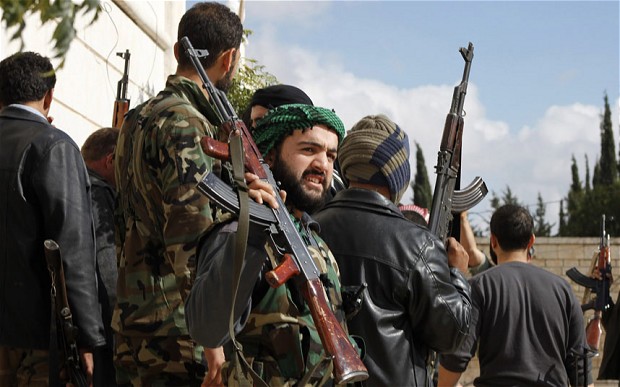Discovering MENA: A New (and Improved) Syrian opposition?

One of the differences between Libya and Syria cited by many pundits (and often justifying the non intervention of foreign forces in the country) is the absence of a unified opposition that could eventually be in charge of spearheading the difficult transition process after Assad’s overthrow. At the outset, this responsibility fell into the hands of the Syrian National Council (SNC) members. The body, nonetheless, started receiving more and more criticism, leading to an increasingly divided opposition (as I already pointed out weeks ago) and to a palpable disenchantment within all its Western and Arab partners, falling “from darling to outcast” and no longer being considered a legitimate representative of the Syrian opposition, as US Secretary of State Clinton recently stressed (“The SNC cannot anymore be considered as the leader of the opposition”). According to Al-Monitor, this failure is also Turkey’s failure, for the latter has repeatedly tried to unify the opposition and foster the SNC’s role.
Negotiations were scheduled to start on Thursday in Doha (here’s the “rising star” again!), although previous talk within the SNC (whereby the group will supposedly expand its membership from 300 to 400, as well as elect both a new leader and an executive committee) kicked off on Sunday 4. After dissident former MP Riad Seif met with other opposition figures (mainly Muslim Brothers, but also tribal leaders, Kurdish representatives and secularists) in Amman, many believed he was set to become the new head of a new government-in-exile, although he himself repeatedly denied these rumours (he’s already 66 and suffers from cancer). This new (and long overdue) unifying body was going to receive the name of “Syrian National Initiative” and was going to allegedly be composed of 60 members, 14 members of them from the SNC executive (as it won’t replace the SNC itself), three members of the Kurdish National Council, representatives of on-the-ground activists and fighters, longstanding dissidents and religious leaders. The attendants issued an statement claiming that the meeting has one chief aim, to successfully culminate “efforts underway to put in place a unified political body for the whole of the opposition”, adding that “Assad and his entourage leaving power is a non-negotiable precondition for any dialogue aimed at finding a non-military solution, if that is still possible”. In the statement, the group also significantly backed the “Free Syrian Army and the movements behind the revolution on the ground as legitimate means to topple the criminal regime”. According to Al Jazeera (reporting on the ongoing deadly daily clashes), SNC chief Abdel Basset Seida nonetheless denounced what he called “efforts to bypass the SNC” and “numerous attempts to find substitutes” for the group.
In principle, talks were scheduled to take place just during Thursday, but were understandably extended by at least another day. According to the New York Times, attendants said much of the first day was wasted on “flowery speeches about nationalism rather than addressing unity”. But it seems leaders came to terms at midnight, chiefly because the host country warned them: either you stay until you reach an agreement, or otherwise we will withdraw all kinds of the support you’ve been receiving until now.
On Friday, the SNC elected George Sabra, a Christian (and apparently, a former communist!) imprisoned by both Assad junior and senior, as its President. His first message was crystal clear, and targeted those abroad (mainly in the West) who had dared to criticize the group without really standing behind the uprising, notably praising it with laudable speeches but not providing actual support: “we [the Syrian opposition in general, the Free Syrian Army in particular] need weapons so as to put an end to the bloodshed that started nearly 20 months ago”. The group also anointed a Muslim Brother, Faruk Taifur, as its Vice President.
And good news was finally broken: the heterogeneous opposition reached an agreement Saturday overnight (after more than 12 hours of talks!), mainly thanks to the SNC giving in and accepting to carry on negotiations they had shown heavily reluctant to. Following the initial blueprint, a new political coalition will be created, composed of approximately 60 members representing all factions within the broad opposition and with the aim of giving birth to a transitional government, composed of 10 representatives, a judicial body and a Supreme Military Council. On Sunday, final talks took place (the attendants wanted to give their final touches to the internal by-laws) and an official ceremony to celebrate the signing of the agreement was held in the Qatari capital.
Ultimately, the attendants created a new coalition intended to receive the Arab countries and West’s blessing and, above all, recognition. The body will finally receive the name of National Coalition of Syrian Revolutionary and Opposition Forces. A new leader was also elected: the President of the new umbrella group will be former imam Sheikh Ahmad Moaz al-Khatib, believed to be the best unifying figure nowadays. Vice presidents will be Riad Seif and Suhair Atassi (a woman!). It was also agreed that revolutionary councils from fourteen Syrian provinces will now each have a representative. A Revolutionary Military Council will be created as well, mainly charged with funnelling weapons and money to fighters on the ground.
